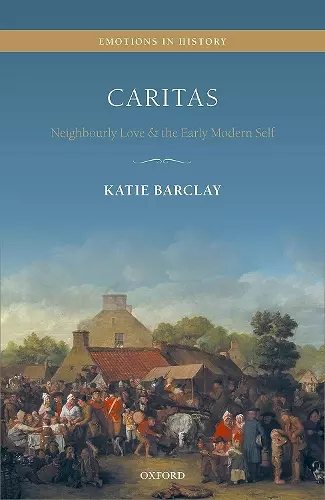Caritas
Neighbourly Love and the Early Modern Self
Format:Hardback
Publisher:Oxford University Press
Published:28th Jan '21
Currently unavailable, and unfortunately no date known when it will be back

Caritas, a form of grace that turned our love for our neighbour into a spiritual practice, was expected of all early modern Christians, and corresponded with a set of ethical rules for living that displayed one's love in the everyday. Caritas was not just a willingness to behave morally, to keep the peace, and to uphold social order however, but was expected to be felt as a strong passion, like that of a parent to a child. Caritas: Neighbourly Love and the Early Modern Self explores the importance of caritas to early modern communities, introducing the concept of the 'emotional ethic' to explain how neighbourly love become not only a code for moral living but a part of felt experience. As an emotional ethic, caritas was an embodied norm, where physical feeling and bodily practices guided right action, and was practiced in the choices and actions of everyday life. Using a case study of the Scottish lower orders, this book highlights how caritas shaped relationships between men and women, families, and the broader community. Focusing on marriage, childhood and youth, 'sinful sex', privacy and secrecy, and hospitality towards the itinerant poor, Caritas provides a rich analysis of the emotional lives of the poor and the embodied moral framework that guided their behaviour. Charting the period 1660 to 1830, it highlights how caritas evolved in response to the growing significance of romantic love, as well as new ideas of social relation between men, such as fraternity and benevolence.
With Caritas: Neighbourly Love and the Early Modern Self, Barclay offers a sensitive and thorough account of social life in eighteenth-century Scotland...Shuttling between public customs and private experiences, Barclay's nuanced examination of the interchange between the communal norms of caritas and the construction of the self is persuasive and provocative. * Evan Gurney, University of North Carolina, Journal of British Studies *
Caritas is a sensitively researched and sophisticated book, and will be of interest to students and scholars interested in the lives of ordinary people during the early modern period...The clearest strength of this book is that Barclay shines a light on a broad section of Scottish society who have traditionally been overlooked - from illegitimate children striving for parental love and affection to wandering travellers seeking shelter, comfort, and acceptance far from home. * Rebecca Mason, The Journal of the Social History Society *
There are many themes in this book that will be of interest to historians working on marriage, childhood and youth, pregnancy, infanticide and rape. There are also fascinating insights into notions of privacy and secrecy, and the practices of neighbourhood socialising, gossip and drinking. Barclay excels at uncovering the details of the lives of the poor, and these are dispersed throughout the book, through brief examples as well as more extended life stories. * Elizabeth Foyster, University of Cambridge, Family & Community History *
ISBN: 9780198868132
Dimensions: 242mm x 161mm x 17mm
Weight: 484g
240 pages